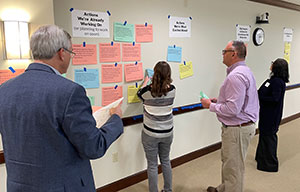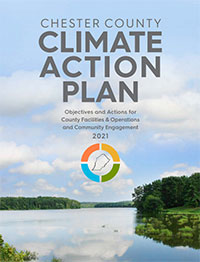County Leaders Discuss Direction of Chester County Climate Action Plan in 2023
Posted December 21, 2022

Chester County department leaders and partners met recently to review and prioritize long-term and short-term steps that must be taken to achieve the County's Climate Action Plan goal of reducing greenhouse gases. The Climate Action Plan, adopted in October 2021 by the Commissioners, calls for the County government's facilities and operations, as well as the Chester County community as a whole, to cut emissions by 80 percent by 2050.
The County's Sustainability Director, Rachael Griffith, who presided over the meeting, said the County must lead by example to achieve such an ambitious goal.
Griffith noted, "I am consistently impressed by the leadership within each department here, and am so thankful for the widespread support for improving our operations and facilities in alignment with the Climate Action Plan."
"The policy 'stars' are aligning around sustainability and greenhouse gas reduction initiatives, and Chester County wants to be in a strong position to take advantage of resources, collaborate with partners, and provide leadership. This meeting was the first step in really institutionalizing the Plan and making sure we are actively working to implement it," added Griffith.

In 2023, some of the top initiatives Chester County government will invest in include:
- Working toward converting a portion of the County's fleet to electric vehicles and installing EV charging stations at some County facilities;
- Investigating how to economically acquire electricity from renewable energy sources;
- Facilitating resource-sharing and collaboration between municipalities interested in advancing sustainability goals;
- Hosting a Sustainability Summit where sustainability experts can network and share information;
- Furthering projects at county facilities related to recycling, waste reduction, and reforestation through an employee committee, Go Green Chesco.
The vision of the Climate Action Plan is to "reduce Chester County's contribution to global climate change and equitably improve the health and well-being of the community by reducing greenhouse gas emissions through government leadership and collaboration; mitigating impacts of climate change through resiliency and planning; and transitioning to clean and sustainable energy generation."
The primary sources of greenhouse emissions come from buildings and energy, transportation and land use, waste management, and agriculture, food, and forestry.

